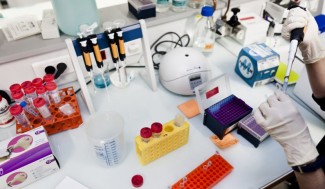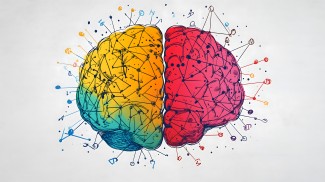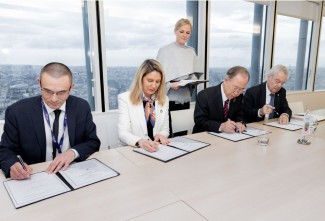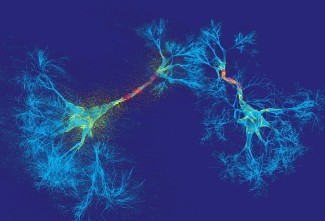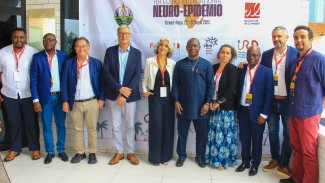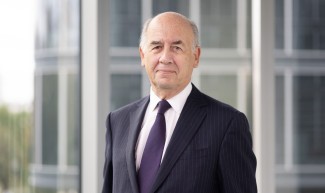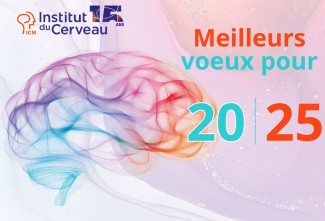In 2024, Paris Brain Institute launched the 4th edition of the Big Brain Theory Program (BBT), designed to foster new and bold projects addressing the next challenges in neuroscience. For the first time, this call is open to our international strategic alliances.
Created in 2016 by Paris Brain Institute, the BBT Program funds innovative, interdisciplinary, high-risk research projects between teams of the institute. After three successful editions supporting 33 research projects, Paris Brain Institute has opened this fourth edition to international partners: The Neuro (Montreal Neurological Institute-Hospital), the Institut Pasteur, and Mission Lucidity (involving the Belgian institutes VIB, KU Leuven, UZ Leuven and imec). This expansion aims to promote collaboration with the top experts globally. This first international BBT call reflects Paris Brain Institute's commitment to strengthening ties with leading foreign research centers and developing international collaborative projects to accelerate brain research and tackle neurological diseases.
Thinking outside the box
The BBT program aims to engage Principal Investigators (PIs) in synergistic collaborative efforts to broaden the impact of their research and foster pioneering projects with breakthrough potential in any domain of neuroscience.
Paris Brain Institute awards these grants to fund innovative, “out the box” thinking and interdisciplinary research projects in neuroscience. Collaborators must combine their expertise innovatively to address significant unresolved problems and/or methodological/technological bottlenecks in basic and/or clinical neuroscience.
Selected by a high-ranking international scientific committee, Paris Brain Institute’s Scientific Advisory Board, the chosen projects explore original ideas and bold hypothesis at their earliest stages. The BBT program aims to provide seed funding for these projects to achieve initial proofs of concept, enabling them to secure further institutional funding and ultimately revolutionize the approaches to treating central nervous system disorders.
New collaborative projects
The strong links developed with our renowned partners has fostered creative ideas to tackle current challenges in Neuroscience, to fund a first collaborative project between France and Belgium.
- The project “Mechanisms of variations in the tempo of synaptogenesis and their impact on brain circuit assembly and plasticity” led by Bassem Hassan (Paris Brain Institute coordinator, INSERM researcher) and Pierre Vanderhaeghen (VIB-KU Leuven) aims to study the mechanisms underlying the synaptic developmental timing, and their impact on neural circuits. This project is funded by the generosity of donors of Paris Brain Institute - the Fondation Marie-Françoise Parayre Chaufour.
This year Paris Brain Institute, The Neuro (Montreal Neurological Institute-Hospital) and the Institut Pasteur have partnered to build on their strengths and encourage international scientific innovation, by funding 2 innovative collaborative projects:
- The project “Deciphering molecular actors involved in glioblastoma-associated microglia phenotype triggered by the hormonal macroenvironment“ will be led by the Paris Brain Institute coordinators Ahmed Idbaih (PU-PH, Sorbonne Université, AP-HP)/Maite Verreault (Paris Brain Institute), Stefano Stifani (the Neuro coordinator), and Philippe Bousso (Institut Pasteur coordinator). The project aims to understand how hormones (in the body) affect the behavior and characteristics of specific brain cells in glioblastoma.
- The second project “Evolutionary and developmental trajectories of primate brain areas involved in social relation“ led by Julia Sliwa (Paris Brain Institute coordinator, CNRS researcher), Justine Cléry (The Neuro coordinator), and Roberto Toro (Institut Pasteur coordinator) aims to understand how neural circuits implement higher social skills and enable us to navigate in our societies smoothly.
These projects are funded through the generosity of donors at The Neuro, and of Paris Brain Institute (RMF), and by the Institut Pasteur’s own funds.
To foster innovative and cross-disciplinary projects between our research teams, Paris Brain Institute will fund five projects involving two different Paris Brain Institute teams:
- The project “Vision Beyond External Reality: multimodal neuroimaging of visual mental imagery in wakefulness and sleep” led by Paolo Bartolomeo (INSERM researcher) and Delphine Oudiette (INSERM researcher) aims to identify the cortical nodes responsible for stimulus-independent imagery during wakefulness and sleep onset, along with their temporal dynamics.
- The project “Brain specialization for words and numbers: A high-resolution fMRI-MEG precision imaging study” led by Laurent Cohen (PU-PH, Sorbonne Université, AP-HP) and Stephane Lehéricy (PU-PH, Sorbonne Université, AP-HP) aims to study the regional specialization for words and numbers learning in brain, and to understand the role of long-distance connectivity in the nature and origin of such specialization.
- The project “Metabolic stress as a modifier of disease course in hereditary spastic paraplegia SPG4”led by Dafni Hadjieconomou (Paris Brain Institute researcher) and Frédéric Darios (INSERM researcher) will assess whether the metabolic changes imposed by the environment can be a modifier factor for the progression of the SPG4 hereditary spastic paraplegia.
- The project “Placebo gives you wings: Testing the phenotypic plasticity of placebo effects in flies” led by Liane Schmidt (INSERM researcher) and Bassem Hassan (INSERM researcher) will explore the placebo effects in a Drosophila model of Parkinson’s disease.
- The project “Investigation of cross-species neuromodulatory mechanisms for treatment of traumatic brain injury” led by Jacobo Sitt (INSERM researcher) and Claire Wyart (INSERM researcher) proposes to use a genetic model organism to unravel the physiopathology of traumatic brain injury and use it as a pre-clinical model.
The five projects are supported by the Institut Hospitalo Universitaire (IHU) - Paris Brain Institute.

